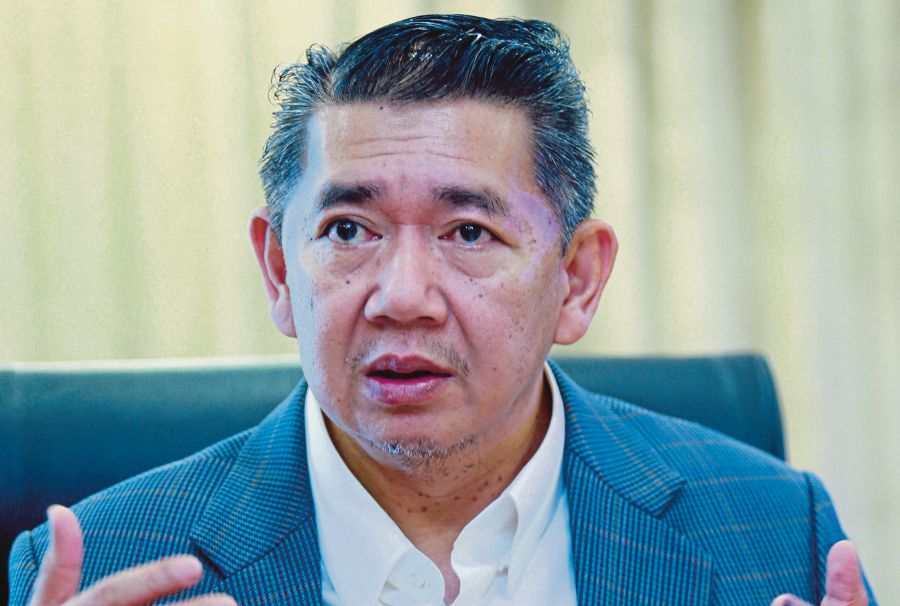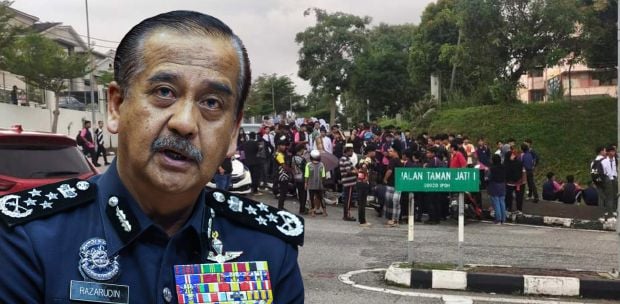New Agriculture and Agro-based Industry Minister Salahuddin Ayub has big plans for the country’s agriculture sector. He is focusing not just on enhancements of current policies and implementations but is also seeking to improve and reform the ministry and agencies under it.
NSTP journalists sits down with speak to the minister, who is also Pulai Mmember of Pparliament, at his office in Putrajaya.
Q: What are your plans for the ministry?
Answer: Principally, I have no issues with continuing programmes implemented by the previous government. However, I plan to improve and examine them to ensure targets are reached.
I have mentioned numerous times that I do not want any political issues to affect the ministry. There will be a mechanism to approve tenders, projects, grants and funding under this ministry. We want to ensure those who qualify for assistance from the ministry will get it, regardless of who they are.
Just because they are from Amanah (Parti Amanah Negara) and they are friends with me does not mean they will get it. Their proposals will have to be examined and they need to be interested and qualified. It would be an advantage if they own a small-scale businesses because it shows that they are prepared for the task.
We must look at South Korea, Japan, Taiwan and countries in Europe as role models because their small- and medium-scale enterprises are developed, given enough funding and subsidies. They receive strong protection from the government and contribute to the country’s income.
Q: Despite being a country with diverse agricultural activities, there is still not enough food for export. Why?
A: I have been seeking an answer to this question for some time. Why has this country failed to export fruits and vegetables despite it being rich in such produce? Of course, this excludes certain fruits, such as the Musang King durian and Harumanis mango. Mangosteen was exported to Japan and Europe, and our starfruit and our chili industry did well previously.
The ministry needs to look at what went wrong. We are falling far behind Thailand.
We have the Malaysian Agricultural Research and Development Institute (Mardi) to do the research, and we have the Federal Agricultural Marketing Authority (Fama) to do the marketing, but what went wrong?
Was it due to insufficient funding, bureaucracy or a missed target group? I will look into this and I am confident that if we focus on certain sectors or fields, it can succeed. A clear example is the Harumanis. It can be done and I believe there are no issues in developing these small-scale farming operations. What we need now is to find a mechanism to upgrade the system and produce it on a larger scale.
Q: What about the fate of the beef and dairy industry?
A: I have instructed the ministry’s secretary-general, Datuk Seri Dr Ismail Bakar, to relook the National Feedlot Corporation (NFC) project. Its goals were good and we should accept it. If it succeeds, it can contribute up to 30 per cent of the nation’s beef needs. Currently, we are only at 23 per cent. If we can hit these numbers, we will depend less on imports and this will be good for our gross domestic product.
Q: How will this NFC revival be done?
A: There will be a paper on the project and I will present it to the cabinet. If they endorse it, the project will be redeveloped immediately. The land is there, most of it is in Negri Sembilan, others are in Segamat and Muar.
I will go to Johor and meet the menteri besar. One of the things on my agenda is to request that seized NFC land be returned to the Federal Government.
We may change NFC’s name, but that is not important now. What is important is to get this project off the ground. We will re-look its funding and I’m certain this can be a success.
On the investigations, we will hand it over to the Attorney-General’s Chambers as we will not get involved. Let the law take its course. This is one of the promises made by Pakatan Harapan, where all mega projects will be investigated for corruption. I give the ministry’s legal unit freedom to take action.
Q: What is the status of food security under the new government?
A: Prime Minister Tun Dr Mahathir Mohamad had mentioned that although the country is headed for the industrial era, we cannot leave the agricultural sector behind. A special meeting with the ministry will be held so that I know how much food stock we have. We need to understand how long it can last, how many people can it feed. This has to be determined to ensure food security is addressed.
Q: It is understood that production of rice is not enough to feed our population. What is happening here?
A: I don’t want to say too much since I’m new here, but this is one thing I also aim to find out. Could it be the fertiliser? I’ve been informed that a new act will come into force where farmers will be protected from receiving poor quality fertilisers to ensure they get premium ones. It’s been more than 60 years since independence, and we still have issues such as this? What should be focused on is increasing rice production.
If we talk about land size, Taiwan is smaller, but not only does it have enough for its people, it can even export rice. Meanwhile, Thailand uses the latest technology. It can even harvest three times a year.
What do these countries have that we don’t? We have the Kemubu Agricultural Development Authority (Kada) and Muda Agricultural Development Authority (Mada). We also have an excellent drainage system, enough sources of water and the same types of diseases and weather as
Thailand. But the kingdom has left us far behind.
If we want to be a producing country, a committee at the cabinet level needs to be established to develop the idea. We could set a timeline, maybe five or 10 years, for our country to export rice.
Q: Does the government plan to abolish the rice industry mono-poly?
A: This will be looked into at our third-week policy-level meeting. I will look at the original Padi Beras Nasional Bhd (Bernas) policy. However, I am not only here to address the issue of monopolisation by Bernas, but also other commodities. This will be done in a holistic manner by the cabinet.
Q: Are there plans to reform the ministry and its agencies?
A: We plan to do a structural reform of agencies under the ministry. Based on Pakatan Harapan’s reform mechanism, the appointment of the board of directors must be transparent and balanced, with only qualified politicians included. We will review their record and, most importantly, they need to have credibility and integrity.
I do not want all of the board of directors be politicians either. It must also comprise academicians and experts.
A team will be formed to evaluate these candidates, including checking their status at the Insolvency Department and criminal record.
Politically appointing people, such as choosing friends, only creates space for leakages.
Q: Could the new government’s policy impact the geopolitical landscape?
A: This is a non-issue. Any projects approved by the previous government will be reviewed. Whatever it is about, it must benefit the country.
Q: Will China be maintained as a target market for our products?
A: Of course. It is not only the Musang King, but a lot of our other produce is exported to China. China has a very wide market, thus we will develop the potential. We may increase the number of durian orchards, give more incentives to small-scale farmers and provide technology.
Q: What about more incentives to encourage farmers to dive into the durian world?
A: There are lots of incentives, such as funding and training. We have Mardi, which does research, thus we can develop it further. I’ve been told that the majority of these small-scale Musang King orchards are carried out by the Chinese.
I believe they are very independent and have their own initiatives. I want to ensure that we have a good relationship with them. The ministry plans to engage orchard owners and seek knowledge on how to improve things in terms of marketing and technology.
Q: Do you have plans to work with the Orang Asli as they are known to be well-versed in agriculture?
A: Yes, they have continuously cultivated vegetables and we hope they continue. We will help them, that’s for sure. Nobody will be left behind, be it those in the village or in the forest. I plan to visit them and see what they need.





